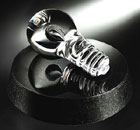Top Biz News
Bearish options on emerging market ETF soar to new high
(China Daily/Agencies)
Updated: 2010-01-27 08:02
 |
Large Medium Small |
Traders pushed options bets that pay off when emerging-market stocks retreat to a 17-month high, speculating China's actions to restrain inflation will slow the global economic recovery.
The ratio of bearish put contracts to bullish calls on the US-listed iShares MSCI Emerging Markets exchange-traded fund (ETF) climbed to 1.97, the highest level since August 2008, data compiled by Bloomberg show.
Trading in options to sell the iShares MSCI Brazil Index Fund jumped to a record 214,404 on Jan 20, while puts on the iShares FTSE/Xinhua China 25 Index Fund reached 164,121 on Jan 21, the most in three months, data show.
"Emerging markets are a source of unease," Dean Curnutt, president of New York-based Macro Risk Advisors LLC, which advises institutions on derivatives, wrote in a note to clients. Investors "are starting to make their bets in ETFs that are directly or indirectly related to China", he wrote.
Inflation in China rose to 1.9 percent in December, exceeding economists' forecasts, and gross domestic product climbed 10.7 percent in the fourth quarter, the government said last week. That's adding to concern policymakers will take steps to restrain prices, spurring speculation that slowing growth in China will derail the recovery in developing countries.
China expanded by an estimated 8.5 percent last year, helping to pull the world out from the worst recession since World War II. The MSCI Emerging Market Index rose 75 percent in 2009, the biggest advance since Bloomberg began tracking data.
Weekly declines
The emerging-market ETF, which tracks shares in 22 developing economies, slumped 5.6 percent last week in its biggest drop since October, before gaining 0.7 percent to $39.90 on Monday. The China ETF slumped more than 5.7 percent in each of the prior two weeks before adding 1.6 percent to $39.69 on Monday. The Brazil ETF tumbled 7.6 percent last week, the most in 11 months, and slipped 0.1 percent to $67.90 on Monday.
"There's definitely some medium-term pessimism from option traders looking for protection," said Caitlin Duffy, an equity options analyst at Interactive Brokers Group Inc, a Greenwich, Connecticut-based brokerage that handles one-seventh of US equity derivatives trading.
| ||||
"There is little to suggest that the price appreciation we've seen in emerging equity markets exhibits the kind of characteristics seen in previous equity market bubbles," David Lubin, an economist at Citigroup, wrote in a recent report.
The most-traded contracts on the emerging-markets ETF over the past five sessions were February $40 puts, according to data compiled by Trade Alert LLC, a New York-based provider of option market analytics.












